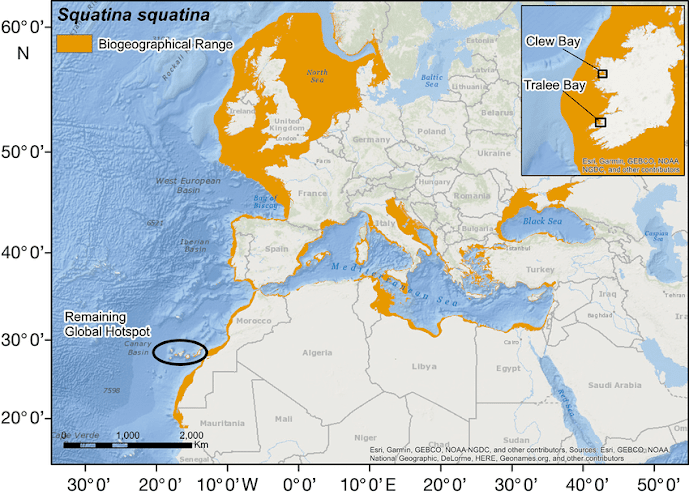Angel Shark
Angel Shark
- Flat bodied sharks with extended pectoral and pelvic fins
-Can grow up to 2.4 Meters lengthwise
-Often confused with Stingrays
-Use their fins to control their movements
-Normally live 25-35 years
-They migrate
-They are a nocturnal species
-Use bioluminescent plankton to hunt prey
-They are carnivores
-They can camouflage
-Their population has decreased by 98%
-About 10,000 left in the world
Species habitat and range
Habitat: Sandy areas within coastal regionsNiche
Sawback Angel Sharks play the role of bottom-feeding predators within their ecosystem, preying on small crustaceans and other bottom-dwelling creatures. Their diet also includes smaller sharks and bony fish. Among the few predators of these sharks are larger sharks and humans (Homo sapiens).
Cause of decline
-Fisheries within the bounds that Angel Sharks populate
-Habitat destruction caused by humans such as pollution, anchor damage, coastal development and marine infrastructure in areas essential to the repopulation of Angel Sharks
-Hunted for their skin and meat which leads to overfishing
-Lack of appropriate legislation for protection and poor enforcement of existing laws
-Intensification of demersal fishing practices over the last century, leading to accidental catching of angel sharks in recreational and commercial fishing gear
Why Care?
-Living beings and they deserve to thrive just as we do even though they're not similar to humans
-If they go extinct their ecosystem will suffer as they're a top predator and keep prey populations under control which protects all of the sea life within their ecosystem
-Would be a loss of biodiversity if they went extinct
-They're an extremely unique shark
- One of the most friendly sharks; They don't bother humans unless they are rudely messed with
Conservation Efforts
The Angel Shark Conservation Network has partnered with many organizations that aid in the fight to conserve Angel Sharks such as:
1. Angels of the Adriatic
- Partnered with the WWF, the Institute of Oceanography and Fisheries, and the Angel Shark Project, to study angel sharks in the Adriatic region. The data collected serves as a baseline for future work in Croatia and includes six recommendations to enhance understanding and conservation efforts for angel sharks in the Adriatic.
2. Angelshark Nursery Areas in the Canary Islands:
- The ASP:CI research identifies one confirmed and 13 potential angelshark nursery areas around the Canary Islands. The research is used to develop a guidance document to enhance conservation efforts of the habitats and Angelsharks.
3. ASCN Research on Angel Shark Extinction Risk:
- Research to examine the extinction risk of angel sharks in the Eastern Atlantic and Mediterranean Sea. The study reveals significant declines in the ranges of Sawback Angelshark, Smoothback Angelshark, and Angelshark, emphasizing the urgency of conservation efforts.
How Geographers and Geospatial Tools Aid in Conservation
The Angel Shark Conservation Network participated in the creation of an Angel Shark Siting Map. The map was created by geographers and used geospatial tools and geography to develop the map.
-Geographers play a crucial role in designing and developing coordinated systems for gathering and managing data. In this case, they helped create the collaborative sightings map for angel sharks, allowing for a centralized repository of sightings across their entire range.
-Geospatial tools and techniques are used to analyze and visualize the data collected from various sources. Geographers can use Geographic Information Systems (GIS) to map angel shark sightings and identify patterns and hotspots, providing valuable insights for conservation efforts.
How You Can Help
-Report sightings of Angel Sharks
-Don't contribute to the overfishing of Angel Sharks by buying their skin or eating them
-Do your own research on Angel Sharks on reputable websites such as the Angel Shark Conservation Network
-Spread your research findings on social media to promote awareness and conservation efforts of Angel Sharks
-Practice sustainable tourism and never disrupt Angel Sharks if you ever come across one










Comments
Post a Comment